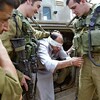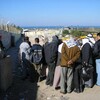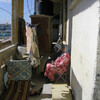
With Jerusalem not its capital
Ramallah 30 June 2005
As with all dialects spoken by people who are close to the land in their daily cycle, the fallahee Palestinian dialect has a homely feel to it. Like the embroidered dresses that older fallahee women still wear in Palestinian refugee camps, villages and cities, this dialect, with its warmth and earthiness, is a national locus for a people whose identity the Zionist project in the Middle East has long tried to suppress, writes EI contributor Rima Merriman. In a PR stunt, Israel has placed people at checkpoints who speak the Palestinian dialect. But despite the smooth talk, what is Israel really saying to the people of Palestine? Read more about With Jerusalem not its capital








